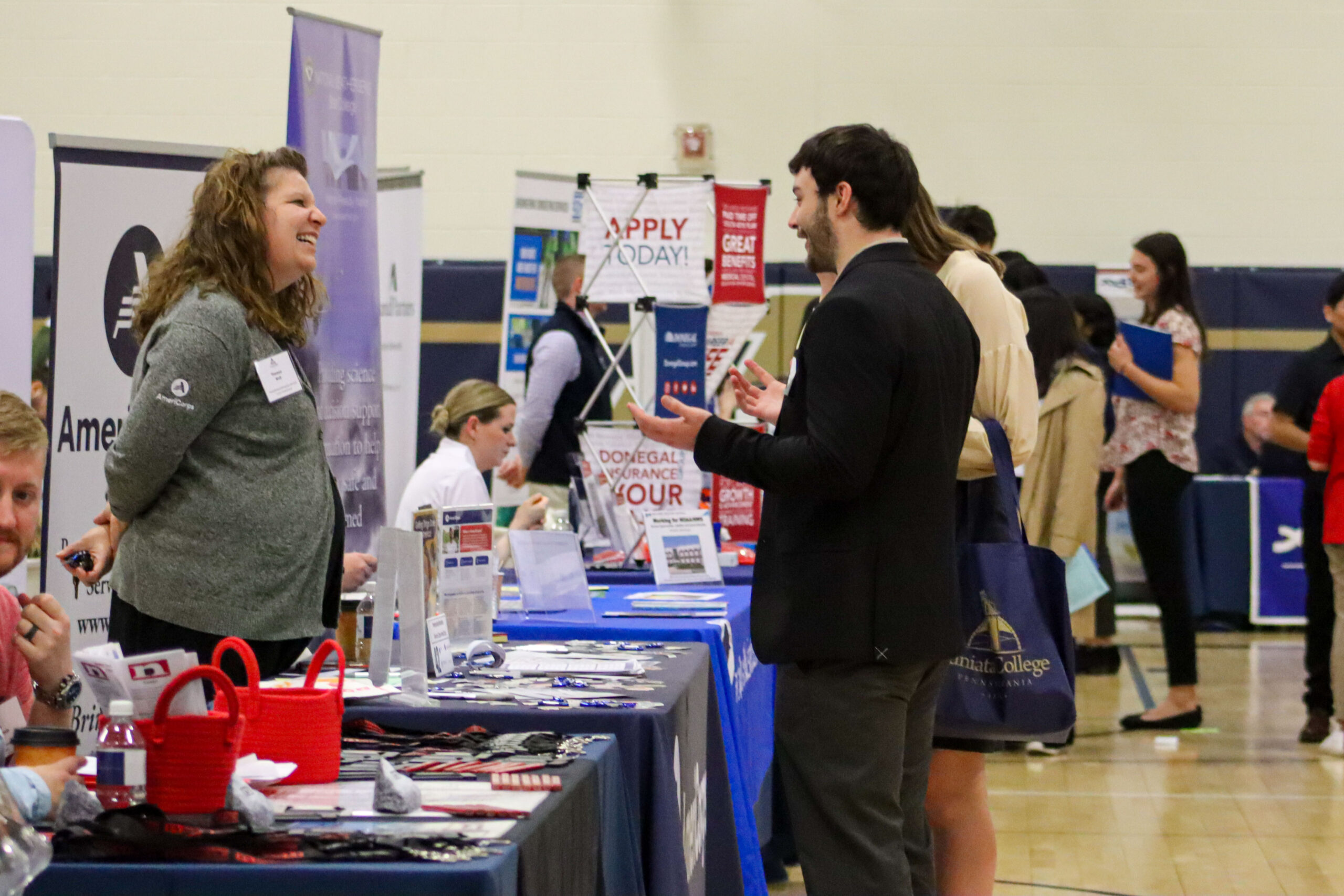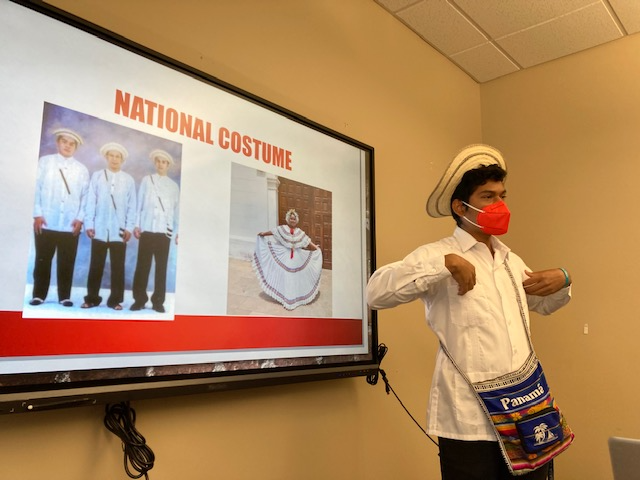Home » Experiential Learning
Category Archives: Experiential Learning
Juniata Mock Trial Team’s Season Wraps Up in Memphis
For the second year in a row, Juniata’s Mock Trial team (lovingly called the Legal Eagles) have made it to the National Championship Tournament. This year’s tournament was hosted by Rhodes College in Memphis, Tennessee, and the best schools in the country were there: Harvard, Yale, UCLA and of course, Juniata College.
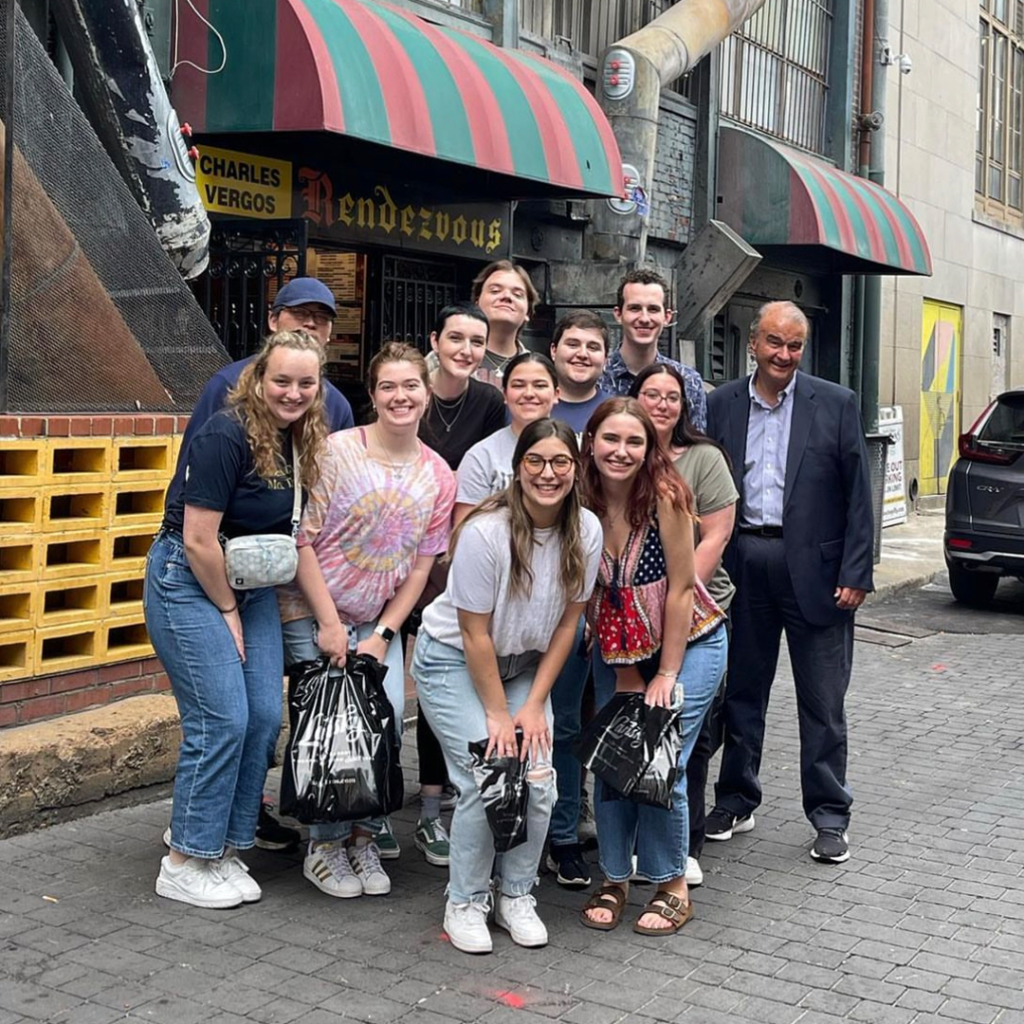
The case being argued was a legal malpractice case. The plaintiff, Robin Skye, was wrongfully convicted of killing their spouse, and ten years later is suing their Defense attorney Aubrey Gold for not doing their job well enough. The team had to prep both the Defense and Plaintiff sides of the case for a little over a month.
As a junior at Juniata, this was my third year on the team and my second time going to Nationals. I have always loved the ability to make connections with other people on campus and people from different schools. This year was no different. During our four trials throughout the weekend, we got to meet and become friends with people from the University of Michigan, the University of Chicago, New York University, and Haverford College. We also got to scrimmage Northwestern University, Macalester College, the University of Arkansas, Hillsdale College, and the University of Georgia. Overall, we finished in the top 48 teams in the country, although official rankings will come out later this summer, so stay tuned!
Mock Trial is of course a serious sport, but we also got to be tourists. From the iconic Bass Pro Shop Pyramid to the duck walk at the Peabody Hotel, we got the full Memphis experience, including getting barbecue at the Rendezvous restaurant. We spent a lot of time bonding as a team and making connections with the other teams we saw, including getting pizza with Macalester.
With the end of Nationals, the Mock Trial season is officially over. We started in August of 2022, and got to travel across the country, from Pittsburgh to Memphis to California. We have played teams as varied as Penn State University, Brown University, and even smaller schools like Wellesley College.
We look forward to the next year of Mock Trial, and the start of Mock Trial Bootcamp next August, where we welcome the new members of the team to campus. Stay tuned for next year’s season, where we will hopefully get a ticket to next year’s National Championship Tournament in Chicago, hosted by Loyola University!
Chem Camp comes back to Juniata!
As most Juniata College students would agree, we pride ourselves on hands-on learning opportunities. In order to learn, you have to practice the concepts yourself. Sure, you might need to watch someone perform a task or complete a problem so that you can understand the basic concepts, but eventually you will have to do it yourself.
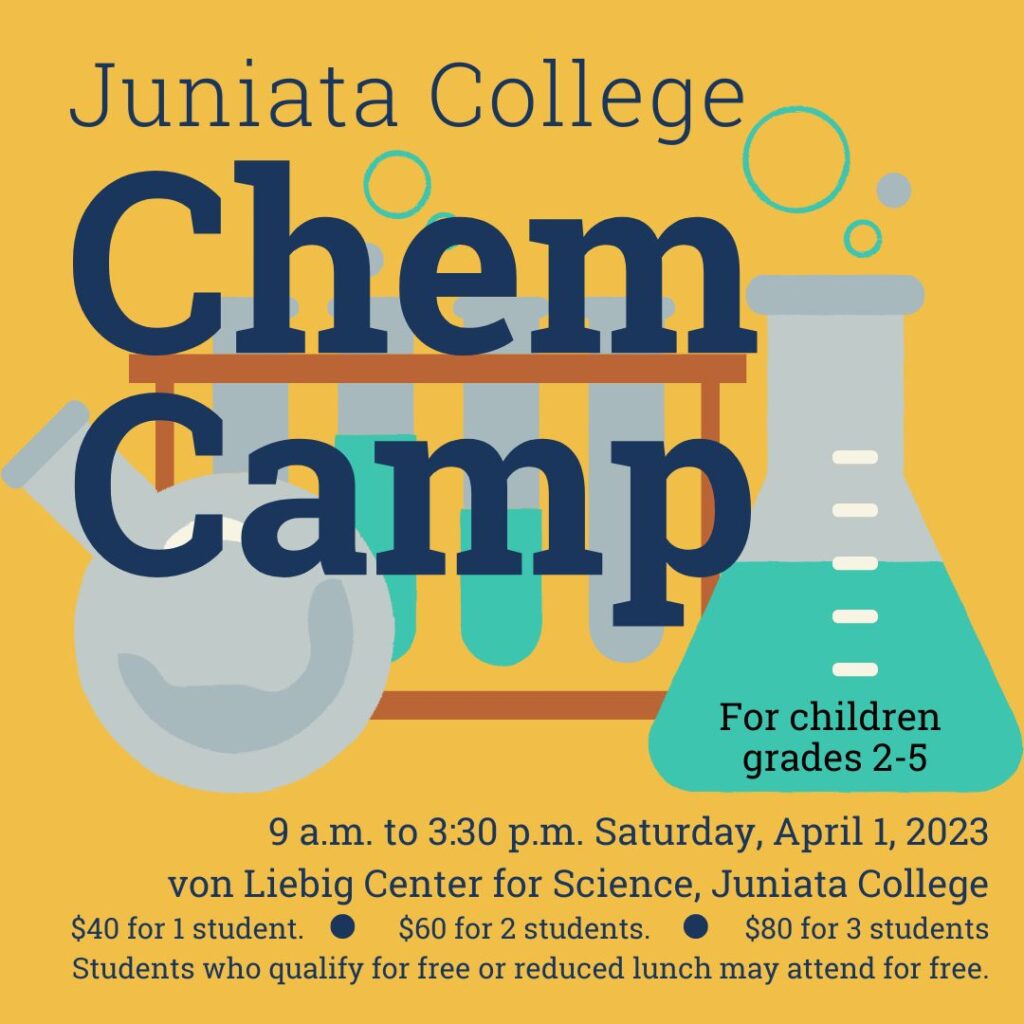
With those ideas in mind, the Chemistry/Biochemistry Department decided to bring back Chem Camp. This camp is a one-day event where local 2nd – 5th graders are invited to campus to participate in science experiments. This year, I was the Chem Camp Coordinator. I worked with professors, staff, and students to make and deliver flyers to elementary schools, advertise the event online, get our volunteers fully cleared to work with the students, and so much more.
This year, our event was held on April 1st, 2023 (not an April fool’s prank) at 9:00 AM sharp. About 45 students were officially registered in the camp and spent the day practicing science with us. While they were here, the students completed five labs, each of which focused on a different branch of chemistry.
- Color changing slime, Physical chemistry
- Volcanoes, Geochemistry
- Chromatography flowers, Analytical chemistry
- Oil spills, Environmental chemistry
- Atomic models, Organic/Inorganic chemistry
To split up the day, we fed the students lunch and took a quick brain break to get some of their energy out. From there, it was back to lab where all the students were fully engaged, making academic messes and learning in a stress-free environment. Around 2:40 PM, we gathered all the students together and welcomed guardians to join us as the Chemistry/Biochemistry Club officers put on a final demonstration. They made us liquid nitrogen ice cream, mixed fire with giant gummy bars, and froze various objects. I think it’s safe to say that all of us were excited to watch the show and make predictions about the outcomes.
This is just one example of how students are able to get engaged with campus. Elementary schools don’t always have the time and resources to complete these experiments in the classroom, so we decided to provide an opportunity to do so. Encouraging youthful students to get involved with science now will help spark creativity, curiosity, and eventually a more diverse field.
A ‘Stellar’ Summer at Juniata
Summer Research in Physics
Before coming to Juniata, I hadn’t thought I would or could do physics research as an undergraduate. Luckily, I was proven wrong! This past summer, I had the opportunity to work in the physics department on an awesome project involving stars! My job was to collect and analyze data on binary stars, systems of two stars that orbit around each other. The data I used was photometric, meaning it related the intensity of the light my target stars gave off. Along with another girl in my department, we created light curves which graph the star system’s brightness across time. We completed a total of six curves this summer. From these curves, we found estimates for the system’s period and measures in the differences between their maxima (when the system is brightest). In the future, we can also use this data to calculate estimates for the mass-ratio and temperature of these stars.
This may sound boring to some, but my job didn’t just consist of graphing points on a curve! My research partner and I read papers, learned how to use new software, assembled telescopes, aligned those telescopes, learned about new constellations, and showed other students craters on the moon. While a fair bit of our work involved clicking buttons, we also got to travel and do some more hands on work. We collected data using a set of remotely-operated telescopes at the Sparks Farm Robotic Observatory which is owned by the college. Sometimes, our tech broke, so we drove down and spent the night running scripts and unscrewing things. By the end, I had mastered the art of falling asleep in a car.
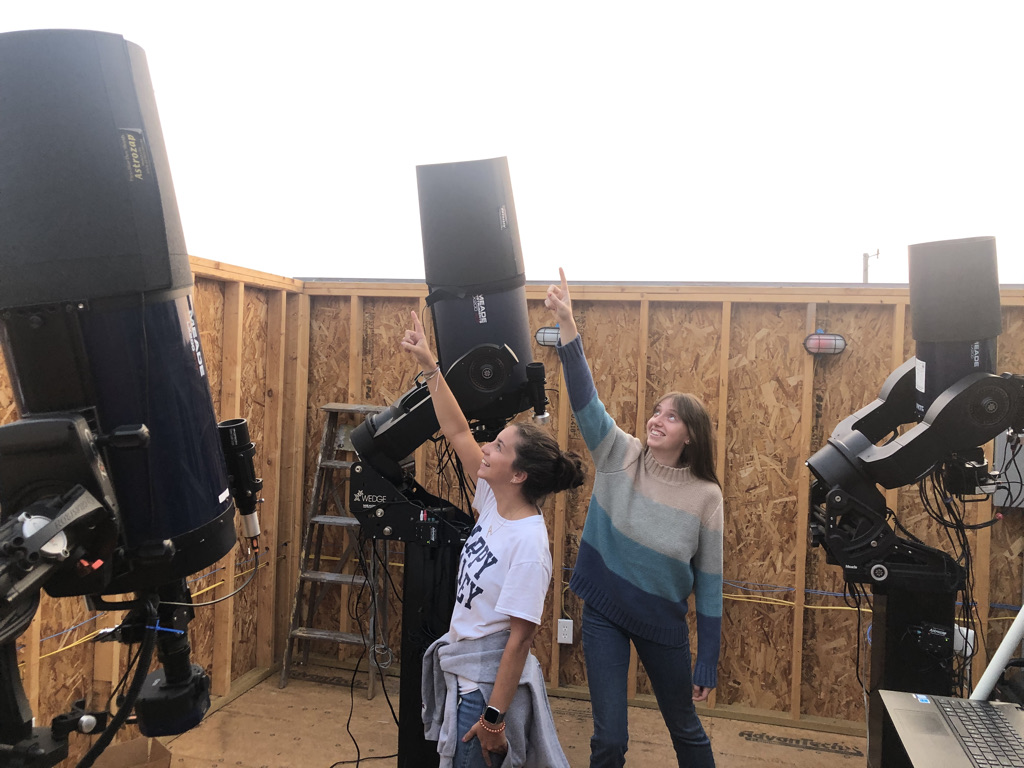
Summer on Campus
Though Juniata is a small school, plenty of other research students were around this summer. Every Wednesday, research students would break from their work and meet in the von Liebig Center for Science. These afternoons, we listened to alumni and postdocs share their research findings and experience. They worked on everything from how nuts affect your gut flora to how birds in the Galapagos are becoming resistant to antibiotics. It was super interesting to hear from alumni, one of whom was actually a Goldwater Fellow. And the lunches were catered! We mainly got lunch from Lil New York, which never disappointed (except maybe for the olives in the empanadas…).
Beyond meeting for weekly lunches, the research students on campus met with those studying at the Field Station for s’mores and canoeing at Raystown Lake. Even though the lake is manmade, the area is super beautiful! Paddling through the mountains after scarfing down four s’mores was incredibly relaxing. Some of us also celebrated the 5th of July with other students working as tour guides on campus.
Presenting My Research
As the summer fun and research wrapped up, it was time to present! My research partner and I presented our findings at the Landmark Research Symposium, a symposium for undergraduate researchers belonging to Juniata’s sports conference. I was nervous for my first real research presentation—especially one online—but it went well! My partner and I successfully fielded questions from professors and some chemistry students. Our sponsor has plans for us to present at an AAVSO (American Association of Variable Star Observers) meeting, along with the Conference for Undergraduate Women in Physics and National Conference on Undergraduate Research. Though I’m super excited to present at more conferences, I still can’t believe our work is quality enough to do so!
Funding
Finally, a note about funding. Juniata has many opportunities for funding summer research, whether through department money or through other programs. Half of stipend was paid through the department, while the other half came from the Student Scholarly Initiative at Juniata. The SSI exists to offer assistance with research and travel funds. As a recipient of such assistance, I have the privilege and obligation of presenting at Juniata’s Liberal Arts Symposium. This is a spring event in which Juniatians can present their research and theses via poster or presentation to other students and professors.
I’m grateful to my department and sponsor for this research opportunity. This semester, I plan to continue observation on new targets visible in Pennsylvania’s winter sky. To other students, especially in the sciences, reach out to your professors for research opportunities. Professors are almost always willing to take you on their projects. The experience is well worth it, especially at Juniata.

